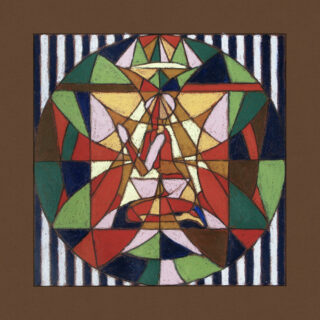Laura Marling
Patterns in Repeat
8/10
Once again Marling proves to be an expert navigator of her own career, with a sketch-like record of songs about motherhood that was recorded while her new baby laid by her side

8/10
Once again Marling proves to be an expert navigator of her own career, with a sketch-like record of songs about motherhood that was recorded while her new baby laid by her side
Has any artist got what they want from the music industry with as much grace as Laura Marling over the last tumultuous 16 years? Impossibly still only 34 years old, she’s released 7 albums in that time, the first 5 as a major label artist. Beautiful though those song-led, indie folk records are, imbued with the spirit of Joni Mitchell and 1970s Laurel Canyon, as I’m contractually obliged to remind you when mentioning Marling, they’ve kept at bay the sort of stardom or execrated growth that is usually required to keep labels like Virgin Records consistently happy. No mega sync deals here. No collaboration that’s blown up or TikTok viral smash. No one crossover hit (album or indeed song) to dine out on either. Marling has quietly plied her contemplative trade under her own steam, seemingly left to her own devises since she was 16 years old.
Her side project with producer and Tunng architect Mike Lindsay has trod a similar this-is-what-I-want-to-do-now path: their excellent band LUMP is a psychedelic trip that channels a more frazzled image of California, weirder than Marling’s solo work, but ultimately on a par with it in terms of broad commercial appeal. At their live shows, and in their photo shoots, the essence of the band takes the form of a featureless yeti.
In 2017, when the musician Lucy Rose came on our Midnight Chats podcast, she told us about how she’d recently bumped into Marling in a restaurant in Kings Cross. The thing was, Marling wasn’t a fellow diner; she was working in the kitchen. For fun. I only know it was for fun because I asked her about it on a more recent episode of the show. It was whilst she was making her fourth album, I Once Was An Eagle. She said that she’d begged the chef to let her work there, out of her curiosity of how things work, and she was quick to acknowledge her privilege in being able the pursue such a vanity. But the fact remains that Laura Marling – a Brit Award-winning professional musician, signed to a major record label – chose to work the sort of hard graft that so many other musicians have historically hoped to escape should music go well for them. If there have been other musicians who’ve made their forth albums alongside a day job they don’t really need, I’ve certainly no idea who they are. Marling simply can’t sit still. With no fanfare, she’s also trained as a yoga teacher between records, and more recently completed a Masters degree in psychoanalysis. The degree was to smooth a chip on her shoulder, to prove to herself her academic mind, which until that point had 5 GCSEs to its name. Marling had been a patient of psychoanalysis in her 20s, and found it to be profoundly beneficial, especially in giving her confidence to speak. When she told me that she’d struggled with that previously, my mind went straight to her winning her Brit Award for Best British Solo Female in 2011, when she was just 21. I remembered her as being overwhelmed, awkward and quick to get off the stage. Looking back at that footage, I might not have been a million miles off but she was also taking it all in rather than frozen in panic, calm as much she was bemused, and, in actual fact, extremely cool. Like her rejection of straight up careerism was there for us see, even back then.

Marling is now the independent artists many always presumed she was. But it’s by the by. Her eighth album, Patterns in Repeat, once again sees her call the kind of shots she always has, emboldened further by her becoming a mother for the first time 18 months ago. Her daughter and the experience of motherhood squarely inform every element of this record. Thematically is perhaps a given, especially for an artist who has always sung about womanhood, sex and relationships, with songs here called ‘Child Of Mine’, ‘Lullaby’ and ‘No One’s Gonna Love You Like I Can’. But before you get to the news that Marling won’t be touring this record – or again in the foreseeable future whilst she raises her family (she’s currently connecting with fans instead through her Substack) – you’re first confronted with how close the whole thing sounds. That’s because Patterns in Repeat was recorded at home, and not even in Marling’s sound-treated basement studio but in her living room, with her baby amusing herself beside her or sleeping nearby. She opens the record with a rustle and a squeak to set the scene. With the gain cranked up to mitigate for Marling having to keep the noise to a minimum, she allowed her situation to dictate this quick record of simple, pretty, deeply sentimental acoustic songs. It’s no wonder, then, that when her producer Dom Monks pushed for what he hoped were 10 demos to be rerecorded in a studio, Marling insisted that her raw files, that captured an unreplicable moment in her life (one that was so fundamental to the words she was singing), needed to remain as they were. Yet Monks has worked magic here. To call the finished Pattern in Repeat “raw” or “rough”, or even “sparse”, would be misleading. Overdubbing Marling’s vocals and recognising that Rob Moose’s string arrangements were all else that was needed, the songs here are sketch-like but appear naturally lush. The songs all start with a roomy silence, but once they’re underway it’s hard to not be mesmerised by Marling’s voice, and easy to reject the idea of this being something of a lo-fi album. As Moose’s strings rise and swoop to carry along the upbeat ‘Caroline’, or almost invisibly sidle up to Marling on ‘Your Girl’ (the record in McCartney melody mode), the last thing you’d want to hear is any kind of rhythm section, and so it’s left off the entire record.
The track title ‘Lullaby’ (a literal lullaby) sums it up best: that’s what almost every song sounds like. Even the gloomy, Western-ish abandonment tale ‘The Shadows’, perhaps, which is followed by a woody instrumental interlude that acts as a playful palette cleanser where, not for the first time, Rob Moose’s strings recall the comforting melancholy of ‘Eleanor Rigby’.
Before the record’s end Marling pushes her own sentimentality to breaking point, and with it Patterns in Repeat into what it really is: not just a love letter to her new daughter, but one to her entire family. The track ‘Looking Back’ was written by her father when he was in his 20s, from the vantage point of a man the age he is now, looking back at his life. To this days it’s what he reaches for whenever he picks up a guitar, and Marling has heard it a thousand times in her life. She’s already stolen its chord structure for a previous song, but this time she’s performing the whole thing. Every reflective, poignant, sad moment of it. I asked her what her dad thought of her version of his lifelong song; she said he still hadn’t heard it and won’t until it’s released this week, but when he played it at her home shortly after her daughter was born it completely devastated her. To her own daughter she sings a line that opens the album on ‘Child of Mine’: “You and your dad are dancing in the kitchen / Life is slowing down but it’s still bitchin'”. Same as it ever was.